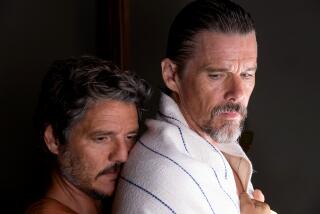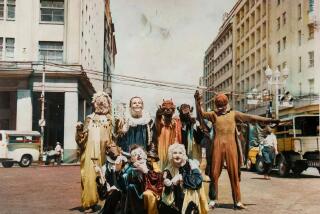Centenarian director takes the long view
Manoel de Oliveira, the director of “The Strange Case of Angelica” (out on DVD this week from Cinema Guild), is himself -- to say the least -- something of a strange case. He turns 103 this December and, having gotten his start in the age of silent cinema, has had a career trajectory unlike any other.
“The Strange Case of Angelica,” a critical hit at last year’s Cannes Film Festival, is a film that the Portuguese director had planned to make half a century ago. Written in 1952, it would have been his second feature, but the Antonio Salazar dictatorship, which he staunchly opposed, derailed his career. An athletic adventurer in his youth (he raced cars, competed in the pole vault and was a trapeze artist), Oliveira tended a farm and vineyard with his wife and directed only a handful of films in the first few decades of his career.
Salazar was overthrown in the Carnation Revolution of 1974, and Oliveira has been making up for lost time since. He came to prominence with a series of period pieces, mostly literary or theatrical adaptations (including “Doomed Love” and “Francisca,” part of the so-called Tetralogy of Frustrated Love), and with age, has only picked up the pace. Since 1990, the year he turned 82, he has averaged one movie a year, an improbable surge that defies all conventional notions of an artistic “late period.”
The most remarkable thing about Oliveira is not simply that he’s so productive but that his films for the most part remain so vital and singular.
Oliveira has complained, with good reason, that too much is made of his longevity, but more often than not, his films have the serene grace and authority of a final testament. (He made an official last film in 1982, “Visit, or Memories and Confessions,” about the house where he grew up, to be screened only after his death.) “The Strange Case of Angelica” ends with a calm acceptance of death and an image of closed doors, but late Oliveira is not just about the specter of mortality.
One of Oliveira’s specialties, as befits his age, is the long view of history -- his 2003 film “A Talking Picture” (on DVD from Kino), starring John Malkovich as the captain of an ill-fated ocean liner, attempts nothing less than to trace the birth (and contemplate the death) of Western civilization. And he continues to find new variations on his beloved theme of frustrated love, as in the Luis Bunuel update “Belle Toujours” (2006, New Yorker DVD) and the droll romantic fable “Eccentricities of a Blonde-Haired Girl” (2009, Cinema Guild DVD).
“Angelica” begins, like many ghost stories, on a dark and stormy night. A photographer named Isaac (Oliveira’s grandson and regular actor Ricardo Trepa) is summoned to a country estate to shoot a death portrait of newly married Angelica -- and the radiant corpse bride miraculously comes to life before his camera. This story of obsession evolves into an enchanting tale of cinema itself, intimately concerned with the power of the image and the act of perception.
Hushed and meditative, “The Strange Case of Angelica” is also complex and unpredictably alive. As in most Oliveira films, the narrative pauses for a leisurely philosophical dialogue or two, and there are playful detours into a wide range of subjects: particle physics, climate change, witchcraft, the metaphysics of photography.
For the first time, Oliveira uses special effects -- to show dead Angelica’s resurrection and a dream of floating to the heavens -- and his charmingly homespun magic more than anything else brings to mind the turn-of-the-20th-century trickery of Georges Melies. Despite various present-day references, much about the film, from the way characters speak to Isaac’s old-fashioned processing of photographic images, suggests an earlier era.
This sense of existing out of time, or in multiple times, is perhaps Oliveira’s defining quality. He has the restless, inquiring spirit of a man in his intellectual prime, but he works with the freedom of a filmmaker almost as old as his medium: a living embodiment of a century of cinema.
--
More to Read
Only good movies
Get the Indie Focus newsletter, Mark Olsen's weekly guide to the world of cinema.
You may occasionally receive promotional content from the Los Angeles Times.










